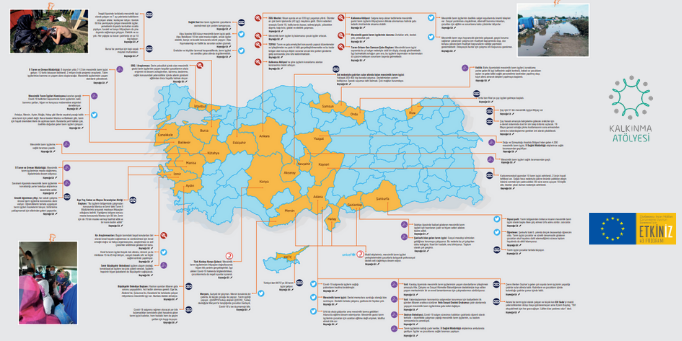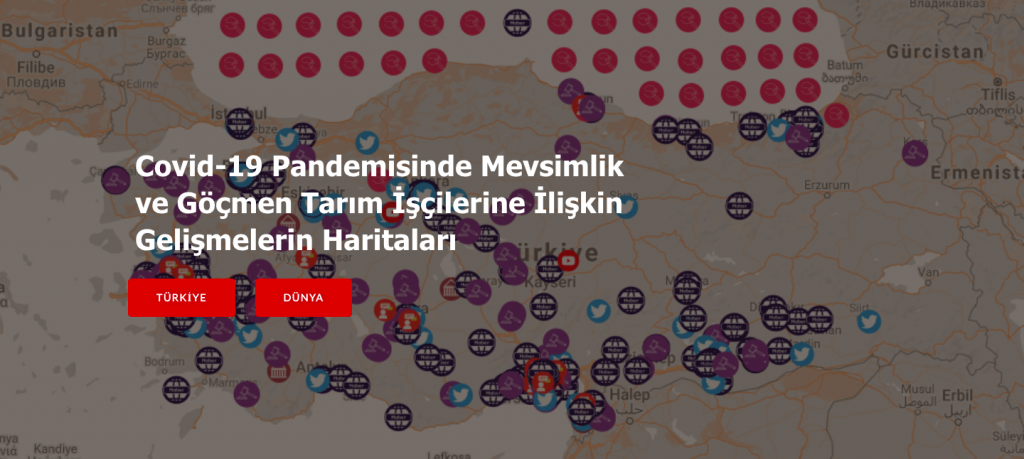Development Workshop (KA) published their report, “Deferred in the Pandemic: Monitoring and Documentation Study on Developments regarding Seasonal Migrant and Refugee Agricultural Workers and their Children in the World and Turkey during the COVID-19 Pandemic” with the support of Etkiniz. KA also compiled the cases regarding the rights of the target group, and published a website containing a map of those cases. Available at: http://harita.ka.org.tr/

Below you can read the executive summary of the report, originally published in Turkish:
This report covers the results of the human rights monitoring work carried out by the Kalkınma Atölyesi [Development Workshop – KA]. The aim of the human rights monitoring conducted by KA was: (1) to collect data on the current situation, needs and problems experienced by seasonal migrant and refugee agricultural workers, and the children in the workers’ families, during a period in which COVID-19 pandemic-related measures and restrictions are being implemented intensively in Turkey and the world; (2) to monitor national and local practices and the provision of human rights, and (3) to document the work conducted for evidence-based advocacy.
The target group of the study is the seasonal migrant and refugee agricultural workers and their children in the world and in Turkey.
The method used for this monitoring work is data collection. Data was gathered from the following sources: news items, articles and analyses published in national and local news sources in Turkey and around the world; the reports of international organisations and civil society organisations; Twitter posts, official decisions, announcements of measures and protocols issued by public bodies in various states concerning the COVID-19 pandemic; campaigns announced by international, national and regional civil society organisations; press releases; open letters, and the practices put into effect in various provinces. The data was collected by browsing the internet after identifying keywords. At the same time, telephone interviews were held with seasonal migrant workers and with agricultural intermediaries working with local workers in order to obtain data from the field. The data collected were processed in the database and selected data were published weekly after being visualised in the form of maps.
Within the framework of the study, a total of 18 maps were generated between March and June 2020 (nine editions of the “Map of Developments Regarding Seasonal Migrant Agricultural Workers and Their Children during the COVID-19 Pandemic” and nine editions of the “Map of Developments Regarding Seasonal and Refugee Agricultural Workers in the World during the COVID-19 Pandemic”). Moreover, 389 items of data covering 70 countries around the world and 455 items of data covering 62 provinces in Turkey and the Turkish Republic of Northern Cyprus (TRNC) were published in the form of digital maps on the harita.ka.org.tr website.
The standards used by KA while conducting human rights monitoring on this topic were as follows: the Universal Declaration of Human Rights, the International Covenant on Economic, Social and Cultural Rights, the International Covenant on Civil and Political Rights, the UN Convention on the Rights of the Child, the ILO conventions, the International Covenant for the Protection of the Rights of All Migrant Workers and Family Members, the UN Convention against Torture and Other Cruel, Inhuman or Degrading Treatment or Punishment (UNCAT), the Convention on the Elimination of All Forms of Discrimination against Women, and the Revised European Social Charter.
The report consists of two chapters:
1- Developments regarding the Seasonal Migrant Agricultural Workers and Their Children in Turkey during the COVID-19 Pandemic
Based on the results of the human rights monitoring work, this chapter identifies violations of rights in the following fields: the right to life, survival and development; the right to safe access to work and living spaces; the right to adequate food and food security; the right to safe passage at the border; the right to a decent and adequate standard of living and safe housing; the right to decent, just and favourable work and working conditions; the right to be protected from economic exploitation; the right to social security; the right to health; the right to education; the prohibition of discrimination; the right to be protected from xenophobia; the prohibition of violence; the right to freedom, and the right to security.
2- Developments regarding Seasonal and Refugee Agricultural Workers in the World during the COVID-19 Pandemic
Based on the results of the human rights monitoring work, this chapter identifies violations of rights in the following fields: the right to access to and benefit from healthcare services; the right to a decent and adequate standard of living and safe housing; the right to decent, just and favourable work and working conditions; the right to be protected from economic exploitation; the right to life; the right to safe transport; the right to social security; the right to safe passage at the border; the right to education; the prohibition of discrimination; the right to be protected from xenophobia; the prohibition of violence; the right to freedom, and the right to security.
Please click the image below to view the website of the map:

